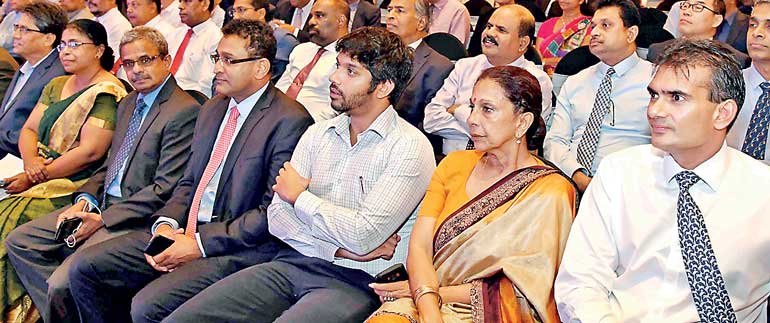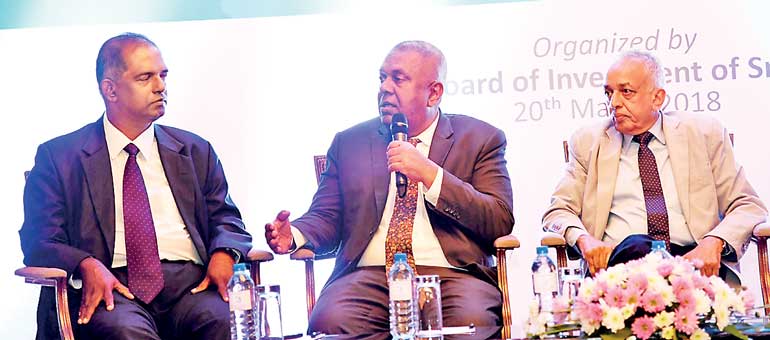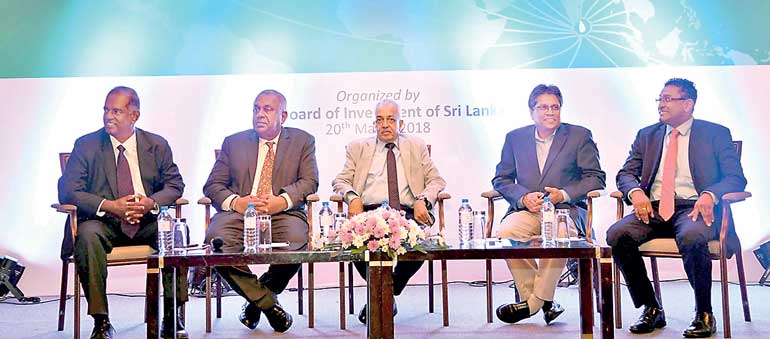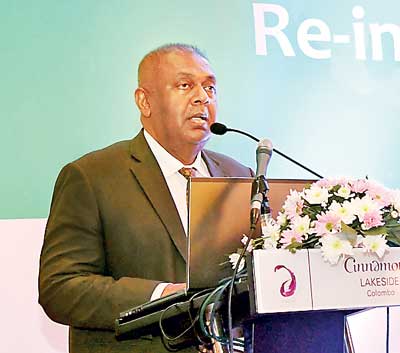Saturday Feb 21, 2026
Saturday Feb 21, 2026
Thursday, 22 March 2018 00:00 - - {{hitsCtrl.values.hits}}



Finance Minister Mangala Samaraweera on Tuesday declared that the post-war economic growth was dominated by debt funded, state driven construction boom which was dangerous and unsustainable.
He made this observation when he spoke at the Board of Investment organised networking session. Development Strategies and International Trade Minister Malik Samarawickrama, BOI Chairman Duminda Ratnayaka and investors were also present. Here are excerpts of the Finance Minister’s speech:
It is a great pleasure to address an audience that has played an important role in Sri Lanka’s economic development in the recent years.
Needless to say, private investment is the key for economic growth of any country. Sri Lanka’s post war economic growth was dominated by a debt funded state driven construction boom. This was always going to be an unsustainable growth path and it has contributed to the debt overhang we are grappling with today.
Over the years, the contribution of BOI companies to the country’s economy has been significant. Last year Sri Lanka saw record FDI, with re-investment by BOI companies playing a key role. In addition to FDI and employment generation, your companies have made important contributions in technology transfer, the development of economic infrastructure. I trust you will continue the good work and enhance your engagement in the Sri Lankan economy.
The focus of this Government since coming to power has been to improve the investment climate to encourage further expansion of the existing investments and attract new investors. In recent past, Sri Lanka has shown tendencies of an inward oriented economy dominated by non-tradable sectors. As a result of which exports have declined and investments in the tradable sector were less promising. We have now set in motion a series of reforms that will change this economic dynamic towards more export orientation.
As a part of this economic reform agenda, a number of measures are being implemented to facilitate private investment. These reforms include the elimination of para-tariffs, opening of a ‘Single Window’ for investment approvals, promotion of identified sectors for investment, the establishment of new export-processing investment zones, and digitisation of public services.
The Government is in the process of entering into new strategic trade agreements with a significant focus on investment. We have recently signed the FTA with Singapore, whilst the FTA with India is being expanded, and a FTA with China is being negotiated, in addition to the existing FTA with Pakistan. Along with EU GSP + facility, Sri Lanka will have duty free market access to India, China, Pakistan, Singapore and Europe. As the FTAs come into effect, investors will have opportunities to link into regional and global value chains, with Sri Lanka as a fulcrum of activity.
Of equal or more importance to market access is the issue of creating investor confidence. Sri Lanka’s track record in policy stability has not been perfect, but our resolve to consolidate a set of rules based, predictable and consistent policy framework remains pivotal. One of the major objectives of our FTAs is to ensure that there are chapters on investment protection. The Singapore FTA in particular sets standard for a high quality, modern trade agreement, which signals Sri Lanka’s commitment to credible policy reforms, as well as our desire to integrate to regional trade blocks.
With the introduction of the Inland Revenue Act, which will come into force from 1 April, the Government has rationalised the incentive schemes provided to investors. This creates a level playing field, compared to previous ad-hoc investment incentives that did not always have an objective basis.
Open ended tax holidays have been replaced by targeted capital allowances which directly reward the investment in capital. Accordingly, a company investing more than $ 3 million in depreciable tangible assets gets a capital allowance of 100% on top of the regular depreciation schedule. For investments over $ 100 million the capital allowance is 150%. There are also benefits for investment in R&D and the IT sector, and for investments in the Northern Province. Strategic sectors such as exports, tourism, and IT are taxed at a concessional corporate tax rate of 14%.These incentives are expected to be superior to previous regimes of open ended tax holidays.
The Government firmly believes that private enterprise is the engine of growth and we expect private investment to reflect this. Whilst there have been recent fluctuations in economic growth, this is an expected part of the stabilisation process, unfortunately exacerbated by adverse climatic conditions that have affected the rural economy in particular.
In order to kick start economic growth, private investment must take the lead. The opportunities are abundant and a clear strategy to support investment has been identified. I trust that you will continue to invest in Sri Lanka and encourage others to do the same. There is no better form of investment promotion than the positive experiences and feedback from existing players.